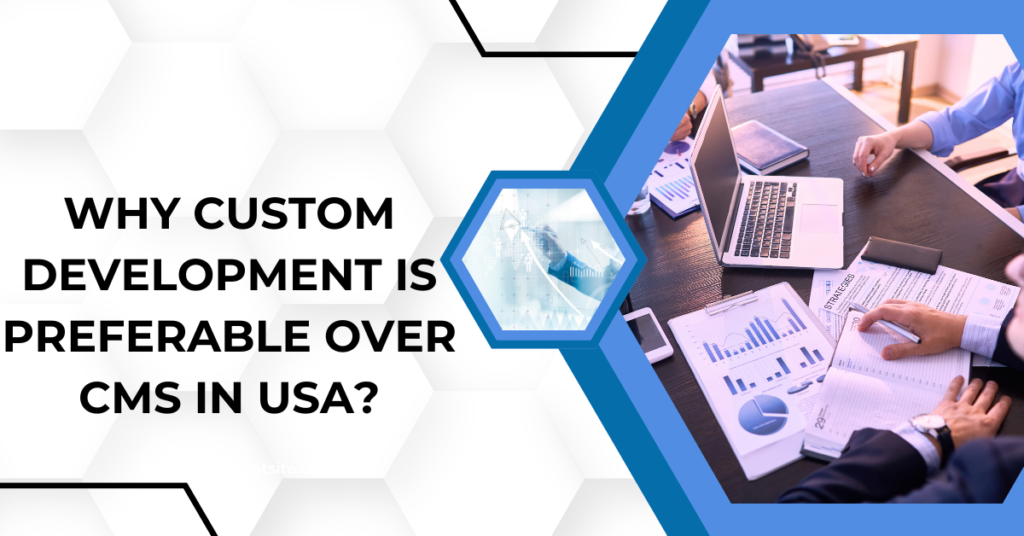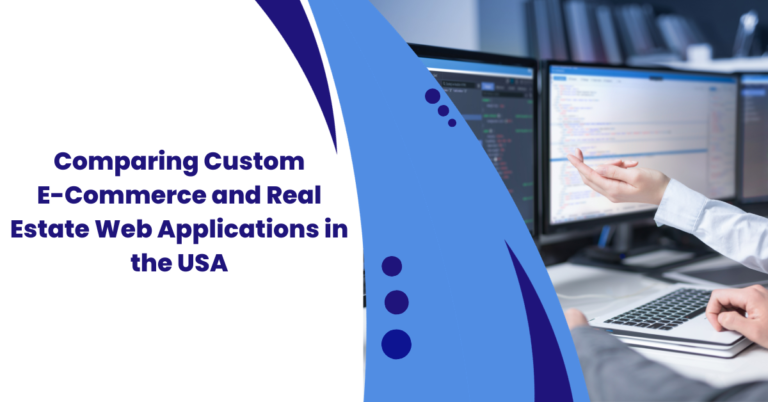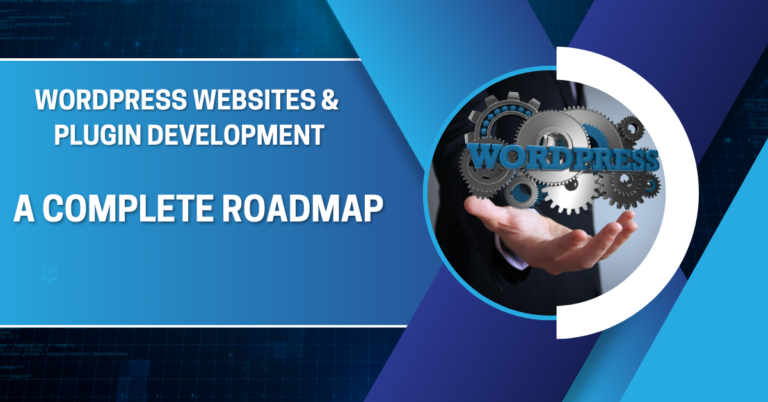As businesses move online, they have unique opportunities to streamline operations and improve customer experiences. However, it can be challenging to choose the most suitable technology platform to maximize the value of these opportunities.
For instance, educational sectors have the choice to choose CMS or custom development. Both options have pros and cons, but Educational institutions must carefully consider which approach aligns with their specific needs and goals to ensure their online presence effectively serves students, faculty, and staff.
In this article, I will explain are going for custom development OR CMS and why custom development is the best option over CMS for businesses.
Let me explain why digital experts recommend a customized approach to enhance user experience, optimize market reach, and secure better investment returns in the long run.
Let’s get started!
Difference between Custom Development and CMS
Regarding web development, there is no one-size-fits-all approach. Let’s understand the difference between custom development and CMS and also explore their pros and cons.
Custom Development
According to my years of experience, custom development is a better option for businesses of all sizes than CMS. It is also a good choice for all types of businesses that need a highly customized website because you have full control over your website’s design and functionality.
It would add unique value to your website or application due to its adaptability. It provides marked edges to rising startups and reputable corporations. So, a custom-built approach is important in forming a unique online identity.
Content Management Systems (CMSs)
They are software applications that allow users to create & manage their websites easily. It provides users with an intuitive platform that simplifies creating and managing websites through a simple user interface.
They have various features, such as a structured page layout, drag-and-drop editors, website themes, and plugins for additional functions. CMSs provide an efficient way for users to manage their website content organization efficiently.
Additionally, most systems offer extensive customization capabilities so users can tailor their site to their unique needs and preferences.
In short, CMSs make it easier for web developers to create and maintain dynamic websites without requiring specialized coding knowledge.
Pros and Cons of Custom Development and CMS
We discussed earlier custom development and CMS differences and how it would be beneficial for business now. We have a look at their pros and cons. It would make it easier for us to choose the best option;
Pros of CMS ( Content Management Services)
1. Cost Effective
They offer in a wide range of free or affordable plugins and themes, allowing businesses to enhance website functionality without significant expenses. CMS is a budget-friendly option for businesses, and their platform is often a free and low-cost attractive option.
2. A Large Community
CMS has a large community of developers and users, which means they have an extensive community that not only provides numerous resources but also fosters a collaborative environment where users and developers often share best practices, tips, and solutions for common challenges.
3. Easy to use
Their platform is super user-friendly. They ensure a wealth of knowledge sharing, where users can find solutions, tips, and best practices for optimizing their websites.
Cons of CMS ( Content Management Services)
1. Performance
Their performance is bad for all CMS users. software requires a lot of processing power and memory, and their system speed is slow and resource-intensive, which leads to lost sales, low conversations, and poor Search engine ranking.
2. Security
They are popular in cyber attacks and vulnerabilities in plugins, which means they have weaknesses that can be taken advantage of by bad people. This puts travel agencies’ websites at high risk of being hacked or stolen from important information.
Pros and Cons of Custom Development
Pros of Custom Development
1. Customization
It has several pros, but when it comes to customization, it means you have full control over the design, functionality, and features of your application. It gives you freedom of user experience that aligns with your brand reputation.
2. Performance
Custom-developed websites have the potential for excellent performance. they are built specifically to meet your business needs. They can be optimized for speed and efficiency. It significantly offers a smooth user experience, high search engine ranking, and business revenue.
3. Security
They are designed to provide security measures to protect customer data and important information for online travel agencies.
Cons of Custom Development
1. Cost
Custom development is much more costly than CMS. It requires more resources and specialized skills.
2. Knowledge
Custom development websites require more knowledge to manage website content.
Reasons Why is Custom Development Preferable Over CMS in the USA
Following are some key reasons that make custom development the best option for all types of businesses that want to create a successful online presence.
Tailor-Made Solutions
As an expert in custom web development, I have seen first-hand how it provides the means to address unique business challenges and needs. When businesses engage in regular out-of-the-box solutions, they often find themselves limited by constraints that do not always fit their specific business ecosystem.
However, with custom web development, an experienced developer can deliver tailored solutions that reflect the nature and nuances of an organization’s operations.
Enables to Create Unique and Innovative Design
As a professional, I know the power differentiation brings to a business. Custom development enables the creation of unique and innovative features, better positioning your business apart from competitors.
Having worked with different businesses, companies, and brands, I have realized that custom development is not one-size-fits-all. It is strategic and requires thoughtful consideration.
Enhanced security Measures
As a web developer, I often encounter clients who question the choice between a custom-driven solution vs a CMS. The heart of the matter frequently boils down to one primary concern:
● Security: Custom web development severely restricts the risks associated with general vulnerabilities in multiple ways.
● Controlled Code: Since the code is original and not readily available to everyone (as with CMS platforms), the minute details about the constructs and implementations would not be available to malicious hackers.
● Limited Exposure: In a custom web application, only the necessary features are in place – reducing the likelihood of a cyber security attack.
● Adapt and Upgrade Access: With total control over source code, development teams can quickly address risks and adapt as necessary.
● Single Threat Vector: Custom sites usually host one type of functionality (like storing user credentials or payment process). That’s why there are fewer open doors for attacks.
The inherent credibility of a custom web application extends beyond its strengthened security measures.
Limitations of CMS
I want to talk about the limitations of utilizing CMS. While CMS has undoubtedly revolutionized how we manage content on the internet, some notable cons hinder its full potential.
● Lack of Scalability: Upgrading website features in line with business growth can be complex with a CMS designed for a specific scale.
● Security Vulnerability: CMS platforms can be more susceptible to security threats, with potential hackers using known vulnerabilities.
● Complexity: While designed to be user-friendly, CMS platforms often have a steep learning curve, as learning and managing all features can overwhelm beginners.
● Limited Control and Customizability: With a predefined set of themes and plugins, CMS often restricts unique and customized design options, possibly not meeting specific business requirements.
● Plugin Compatibility: Plugins, extensions, and modules may not always be compatible with the version of CMS you are using, leading to crashes, security gaps, or reduced functionality.
● Code Quality: As CMS platforms use standard templates and modules, changes at the code level are challenging. Hackers exploit this aspect leaving exposed aspects of standard configurations.
● Frequency of Updates: Some CMS platforms consistently release new updates necessary for your site’s efficient and secure running. However, they can often cause broken features or compatibility issues with other elements of your website.
● Technical Support: Many CMS platforms, especially the free ones, lack a dependable support service. It can be problematic and lead to delayed solutions when troubleshooting technical issues.
● Complex SEO Setting: CMS’s ease of web content management often leads users to overlook the need to manage SEO settings strategically. Weak SEO strategy implementation could negatively impact website ranking.
As a professional web developer, I have worked on various web development projects to create websites tailored to my client’s needs. Custom web development can better serve my clients in many instances because it ensures more flexibility, gives owners complete control over the website, and increases the potential for uniqueness and innovation.
Comparing CMS vs. Custom Development: A Side-by-Side View
Deciding whether to use a CMS or custom development for your website is difficult. Here is a comparison based on my personal experience to help you decide.
| Feature | CMS | Custom Development |
| Cost | Lower upfront cost | Higher upfront cost |
| Time to market | Faster time to market | Longer time to market |
| Flexibility | Less flexible | More flexible |
| Scalability | Less scalable | More scalable |
| Security | Less secure | More secure |
| Control | Less control | More control |
| Customization | Less customizable | More customizable |
| Support | Less support | More support |
| Maintenance | Less maintenance | More maintenance |
| Updates | Less frequent updates | More frequent updates |
| Security updates | Less frequent security updates | More frequent security updates |
| Overall | Good for simple websites and blogs | Good for complex websites and applications |
Which approach is right for your business depends on specific needs and budget. A CMS is a good option for a quick and easy website. But custom development is better if you need a more complex or secure website.
Final Words
My detailed discussion on custom development and CMS has highlighted the contrasting paths to website creation. Why customization? The simple answer refers to four quintessential ideologies for any successful business: control, efficiency, scalability, and uniqueness.
A CMS might court you with easy handling and a brimming set of ready-made templates. But on measuring deeper, one might realize it is bearing a two-sided sword. Predictability might cost your brand the chance to create your digital identity. This challenge is aptly addressed by marching down the highway of custom development, but uniquely crafted websites honoring your business ideology generate better user trust and consequential conversions.
Are you ready to take your business to the next step to unlock its full potential? If you have found this information helpful and ready to explore what lies beyond, do not hesitate. Reach out now.
I am here to provide more insights, answer your queries, and guide you toward your aspirations. It is your time to shine and grow beyond borders!
Let’s schedule a One-on-One Consultation
Drop me an email at info@codendcoffee.com
Call me directly at +1 407 768 4072











